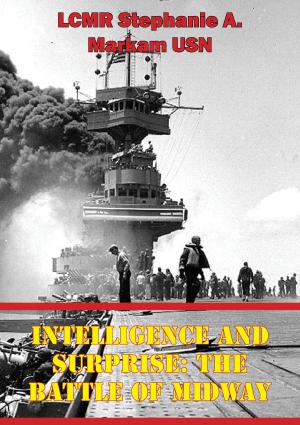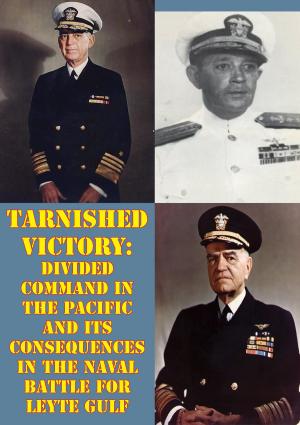Why Gallipoli Matters: Interpreting Different Lessons From History
Nonfiction, History, Military, World War I, Germany, British| Author: | Lieutenant Colonel John M. Sullivan Jr USMC | ISBN: | 9781782897033 |
| Publisher: | Verdun Press | Publication: | August 15, 2014 |
| Imprint: | Verdun Press | Language: | English |
| Author: | Lieutenant Colonel John M. Sullivan Jr USMC |
| ISBN: | 9781782897033 |
| Publisher: | Verdun Press |
| Publication: | August 15, 2014 |
| Imprint: | Verdun Press |
| Language: | English |
After careful study of the Gallipoli Campaign of 1915, why did the British and the Americans come up to contradictory operational conclusions regarding the future applicability of amphibious operations? Divergent views from the lessons of Gallipoli campaign are the result of three differing operational approaches to strategic considerations that Britain and the Unites States faced in the 1920s and 1930s. The first were different theater strategic objectives that required different operational campaigns necessary to achieve each. The second was different operational experiences, which caused one side to focus on the past while the other to the future. The final was the different means available to operational commanders to execute their campaign.
History can often provide contradictory lessons to those who wish to use it to practically apply operational art. Using analogies correctly is important. For the operational commander, drawing the correct lessons learned is made even more difficult by the very nature of inter-service rivalry. Derived from an analysis of the operational art and at operational level of war, the lessons learned from this campaign led directly to the development of sound doctrine, which developed in peacetime was absolutely essential in wartime. Finally, we continue to learn from failure more often than through success, but we must not allow ourselves to be intimidated by failure either.
After careful study of the Gallipoli Campaign of 1915, why did the British and the Americans come up to contradictory operational conclusions regarding the future applicability of amphibious operations? Divergent views from the lessons of Gallipoli campaign are the result of three differing operational approaches to strategic considerations that Britain and the Unites States faced in the 1920s and 1930s. The first were different theater strategic objectives that required different operational campaigns necessary to achieve each. The second was different operational experiences, which caused one side to focus on the past while the other to the future. The final was the different means available to operational commanders to execute their campaign.
History can often provide contradictory lessons to those who wish to use it to practically apply operational art. Using analogies correctly is important. For the operational commander, drawing the correct lessons learned is made even more difficult by the very nature of inter-service rivalry. Derived from an analysis of the operational art and at operational level of war, the lessons learned from this campaign led directly to the development of sound doctrine, which developed in peacetime was absolutely essential in wartime. Finally, we continue to learn from failure more often than through success, but we must not allow ourselves to be intimidated by failure either.

![Cover of the book Merrill’s Marauders: Combined Operations In Northern Burma In 1944 [Illustrated Edition] by Lieutenant Colonel John M. Sullivan Jr USMC](https://www.kuoky.com/images/2015/november/300x300/9781786255747-FuRW_300x.jpg)
![Cover of the book The Long Road To Victory [Illustrated Edition] by Lieutenant Colonel John M. Sullivan Jr USMC](https://www.kuoky.com/images/2014/august/300x300/9781782892687-k2po_300x.jpg)


![Cover of the book Marines In World War II - The Defense Of Wake [Illustrated Edition] by Lieutenant Colonel John M. Sullivan Jr USMC](https://www.kuoky.com/images/2014/august/300x300/9781782892755-aHVZ_300x.jpg)
![Cover of the book Admiral Halsey’s Story [Illustrated Edition] by Lieutenant Colonel John M. Sullivan Jr USMC](https://www.kuoky.com/images/2014/august/300x300/9781782892953-aGsz_300x.jpg)

![Cover of the book Marines In World War II - Marine Aviation In The Philippines [Illustrated Edition] by Lieutenant Colonel John M. Sullivan Jr USMC](https://www.kuoky.com/images/2014/august/300x300/9781782892878-xEPh_300x.jpg)


![Cover of the book Helmet For My Pillow [Illustrated Edition] by Lieutenant Colonel John M. Sullivan Jr USMC](https://www.kuoky.com/images/2015/november/300x300/9781786252036-cMF2_300x.jpg)

![Cover of the book Conversations With A Stuka Pilot [Illustrated Edition] by Lieutenant Colonel John M. Sullivan Jr USMC](https://www.kuoky.com/images/2014/august/300x300/9781782898450-BiYs_300x.jpg)
![Cover of the book Staff Ride Handbook For The Attack On Pearl Harbor, 7 December 1941 : A Study Of Defending America [Illustrated Edition] by Lieutenant Colonel John M. Sullivan Jr USMC](https://www.kuoky.com/images/2014/august/300x300/9781782894513-K1Ik_300x.jpg)
